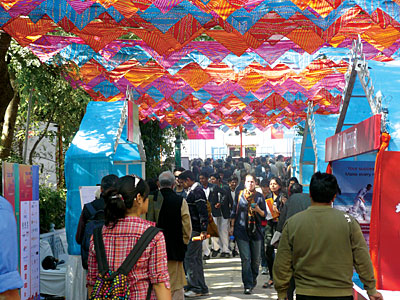 RABI THAPA |
Is there really such a thing as becoming 'a victim of your own success' if you're just getting bigger and bigger (and don't die in the process)? For purists, the phrase can refer to 'over-commercialisation' that pushes an event or product along lines perhaps not originally intended by those responsible, or at least not appreciated by those who were there at the start.
Metallica, middle-aged rockers of Napster notoriety and purveyors of increasingly lumbersome hard rock, fit the bill in this sense. Before they hit the big time with their 1991 Metallica ('The Black Album'), they were revered as the uncompromising masters of thrash metal. Arguably they are doing even better than ever now, with five consecutive studio albums debuting at No.1 on the Billboard 200 since 1991. But tell a fan from the 1980s that you like Metallica, and he's likely to sneer, "So you started with the black album, right?"
The Jaipur Literature Festival has had a similarly rocking trajectory since it debuted in 2006. The inaugural festival featured 18 writers and about 100 attendees, who in the words of co-director (and writer) William Dalrymple "appeared to be tourists who had simply got lost." This year, the festival had 226 speakers (including Nobel laureates JM Coetzee and Orhan Pamuk), and an estimated 50,000 attendees. Unmitigated success, then? It would seem so, but talk to regular attendees, and you get a sense that Jaipur is too much of a muchness.
Even by last year's standards, when a publisher explained to me that she was staying away from the festival because "the idea of an industry party is dull enough, and that of a full-fledged fete horrid", Jaipur 2011 was a blockbuster. The crowds normally only seen for marquee authors spilled over into obscure sessions featuring anyone with international recognition. And, in the case of 'Fractious borders: the ups & downs of Himalayan relationships', sessions featuring anyone famous in the audience. While Sujeev Shakya and Narayan Wagle discussed Nepal-India relations with Foreign Secretary Nirupama Rao, swarms of schoolgirls buzzed around the edges, their eyes firmly on the two stars in attendance, Indian lyricists Gulzar and Javed Akhtar.
We spent much time standing, tut-tutting at people chattering away to each other or their phones during the sessions, and waiting in the serpentine queues for meals and book signings. Inching our way forward through the surging masses from the Vodafone Front Lawns to the Times of India/Coca-Cola stage, turning away from the sight of Candace Bushnall (creator of 'Sex & the City') in her matching tiger print shoes and handbag, it was easy to wonder whether Jaipur hadn't sold out, and if the spirit of the beast wasn't irredeemably tainted. Perhaps it was time to head to the more tranquil literary pastures of Galle, Dehradun, or Paro?
Hold on a minute, I'd tell those turned off by crowded, branded Jaipur, and ask yourself, has the pink city lost its literary soul? Has the branding affected the content in the same way that sponsorship has ruined cricket? Are the tens of thousands present interested more in celebrity than literature?
I'd say no. If the aim is to bring quality literature to the masses at a free event, then the Jaipur festival has surely succeeded. If the elites for whom reading and writing has been an almost exclusive hobby for the bulk of history truly believe in the emancipatory power of literature, then they must also believe that having half a lakh people attend a five-day literature festival is a wonderful thing.
And if it takes branding and a smattering of celebrity authors to make this possible, then so be it. As long as the corporates don't determine content, and as long there is the option of listening to JM Coetzee on 'Imperial English' while 'Sex & the City' is running in a parallel session, it's all good (barring some complaints on crowd management). A literature festival must comprise a judicious mix of the highbrow and the lowbrow, the quick and the dead. And if compromise really is intolerable to the snobs, well then, there's always the aforementioned fests in Galle et al, and who knows, perhaps Kathmandu, soon.
So if the crowds throng Sujan Chitrakar's 'Let's talk about Art, baby!', Bryan Adam's February concert at the National Stadium, or Patan Darbar Square's annual Kartik Nach, this indicates both the success (of the organisers) and the passion (of the audience). Manage the content and the logistics, and the rest will be history.
READ ALSO:
Jaipuri lessons, ARTHA BEED



